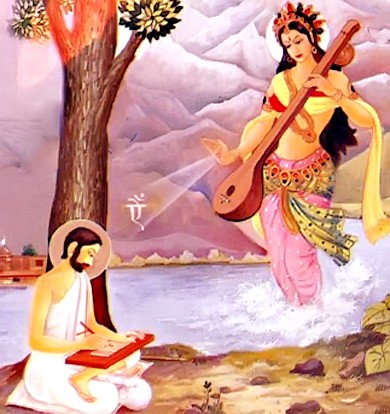
If someone utters the word upadhyayji it would mean Shrimad Yashovijayji Upadhyay. ‘So says Upadhyayji’ is regarded as the final word and ultimate authority in scriptural matters. His contemporary monks regarded him as the sarvajna (omniscient) in matters of the scriptures and also as shrutkevali (scripture – omniscient). Author of more than 100 books in Sanskrit, Prakrut and Gujarati, he also earned the titles of Tattvavisharad and Kurchatsharda. Besides writing the books that were theoretical and academic, he composed poems that were immensely popular. As Shri Bhadrabahuswami was known as antim shrutkevali so also Upadhyayji can be regarded as antim shrutpargami (last knower of all Jain canonical scriptures). Since his time, there has been no other scholar as learned and competent as him. Continue reading “Upadhyay Shri Yashovijayji” »
Upadhyay Shri Yashovijayji
Puniya Shravak
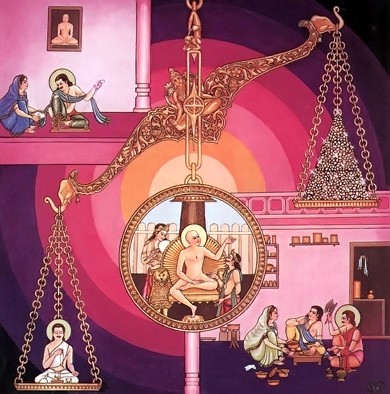
Puniya Shravak symbolized ideal worship and devotion. He was a devotee whose devotion was praised by Bhagwan Mahavir himself. A resident of Rajagriha he came under the spell of Mahavir’s discourses and began to practice aparigraha (abandonment of worldly possessions). He embraced poverty willingly and gave away all the wealth he had inherited from his father. He would be happy and contented with what he earned from making cotton threads. He believed that contentment had nothing to do with possessions, with wealth or acquisitiveness. It is simply a state of mind. Continue reading “Puniya Shravak” »
Samprati Maharaj
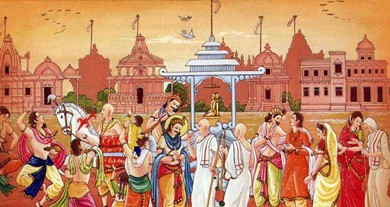
Emperor Samprati, the grandson of Emperor Ashok, occupied a place of pride among the contemporary emperors. Emperor Ashok and his grandson Samprati endeavoured to propagate Indian culture throughout the world. Known as Indrapalit, Sangat and Vigatashok, Emperor Samprati was enthroned in 230 B.C., but he had been handling the administrative duties long before. Continue reading “Samprati Maharaj” »
Sadhvi Malaysundari
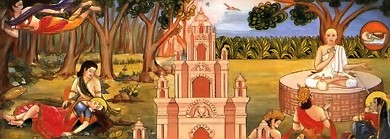
It was love at first sight between Malaysundari and Mahabalkumar. It was so steadfast a bond between the two that they could weather many a storm before and after their marriage.
Malaysundari was the daughter of king Virdhaval and queen Champakmala of Prithvisthanpur. Mahabalkumar was the son of king Surpal. Malaysundari’s step-mother Kanakvati had tried to create a rift between the two for Mahabal had spurned her amorous advances. Mahabal with the help of some secret formula, assumed female form and frustrated Kanakvati’s designs. Continue reading “Sadhvi Malaysundari” »
Shri Devardhigani Kshamashraman
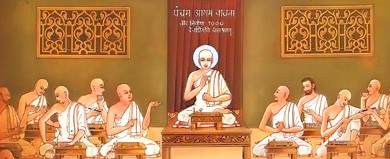
In A. D. 453 in the city of Vallabhi, under the leadership of Acharyadev Shrimad Devardhigani, three unprecedented religious tasks were undertaken which turned out to be landmarks in the history of Jain religion. These tasks were preservation of shrut jnan (scriptural knowledge), a more systematic compilation of the texts and conversion of those texts into written script. Continue reading “Shri Devardhigani Kshamashraman” »
Shri Hirvijaysuri
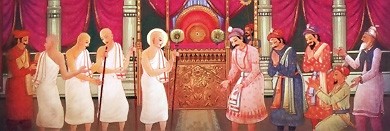
Once Emperor Akbar was looking towards the main road from the balcony of his royal palace in Fatehpur Sikri. Meanwhile he saw a huge procession passing by, wherein at the centre a Jain laywoman (shravika) named Champa sat in splendour and attired in expensive clothes. On inquiry, the emperor came to know that the shravika had undertaken fast for 6 months during which she had taken only boiled water from sun-rise to sun-set and no other food. The Emperor was greatly surprised and on asking the shravika he came to know that it was possible because of the blessings of religious saint like Guru Hirvijaysuri. Continue reading “Shri Hirvijaysuri” »
Sadhvi Chandanbala
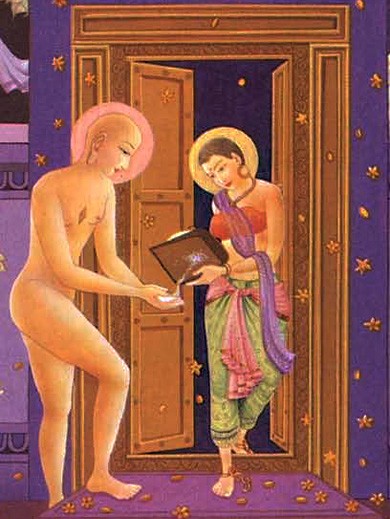
Mahasati (female ascetic) Chandanbala occupies a unique place among the leading 16 satis of Jain relegious history. Besides being learned, virtuous and devoted to penance, she became the first sadhvi (nun) of the sadhvi sangh (order of nuns) founded by Bhagwan Mahavir and thereafter she enjoyed the honour of being the first sadhvi-president (head of the order of nuns) of 35000 sadhvis. Her life-sketch conveys the message that virtue is greater than caste or creed. Continue reading “Sadhvi Chandanbala” »
Anupamadevi
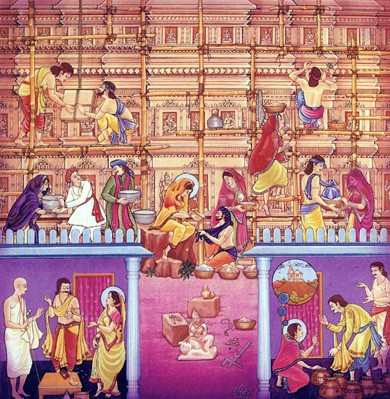
Anupama was Tejpal’s wife. Her complexion was dark and even her body was not that beautiful but she possessed extraordinary intelligence. She showed uncommon common-sense in solving complicated problems not only of the family but those of others as well. Continue reading “Anupamadevi” »









